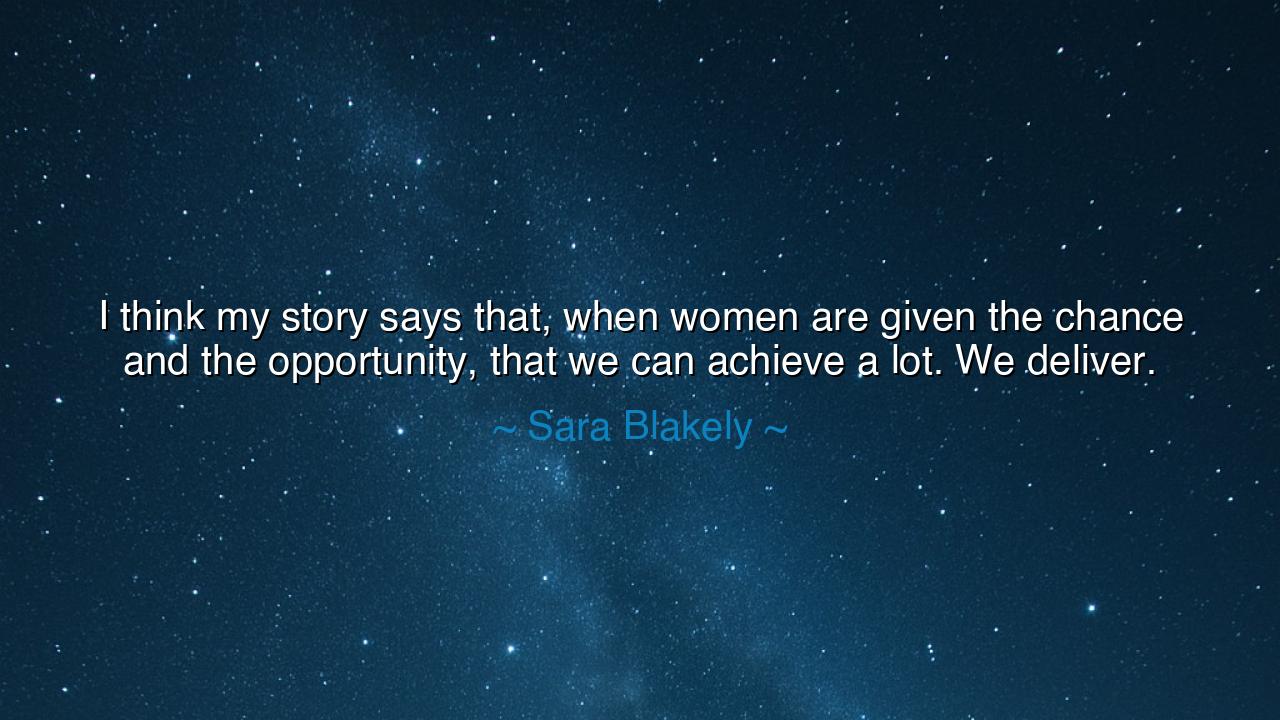
I think my story says that, when women are given the chance and
I think my story says that, when women are given the chance and the opportunity, that we can achieve a lot. We deliver.






Hear, O listeners, the testimony of Sara Blakely, who rose from humble beginnings to become the creator of Spanx, and whose words shine with both humility and fire: “I think my story says that, when women are given the chance and the opportunity, that we can achieve a lot. We deliver.” In these words lies a truth long hidden—opportunity is the key that unlocks the vast potential of women, and when the door is opened, they do not falter; they flourish.
For too long, the world has denied women both chance and opportunity. Their ideas were dismissed, their labor unseen, their ambitions stifled. Yet when barriers are lifted, their achievements reveal themselves in full strength. Blakely herself began with little more than an idea, a few thousand dollars in savings, and the courage to persist. In time, she built an empire worth billions, proving that greatness does not depend on wealth at the start, but on the chance to try.
History, too, offers countless mirrors to this truth. Consider Marie Curie, who, when given access to education and laboratories, uncovered the secrets of radioactivity, changing forever the course of science. Or Florence Nightingale, who, when allowed to serve during the Crimean War, revolutionized the field of nursing and saved countless lives. These women did not wait for permission; yet once even the smallest door opened, they walked through it and transformed the world.
Blakely’s words are also a rebuke to the old order. They remind us that the failure to see women’s accomplishments in the past was not due to their inability, but to their exclusion. The deliverance she speaks of is not only in her own story, but in the stories of every woman who, once given tools and trust, has built, discovered, created, and healed.
Therefore, let this truth endure: when women are entrusted with the same faith as men, they do not only meet expectations—they surpass them. Sara Blakely’s voice is both witness and prophecy: that the future belongs to those who open the gates of opportunity wide, and who believe in the power of women to deliver greatness for all. For the harvest of equality is abundance, and the seed of chance grows into a tree of triumph.






NNnga ngo
I love how Sara Blakely highlights the importance of opportunity in her journey. It’s inspiring to think that women, when given the right platform, can truly thrive. But what do we do for the countless women who don’t even have access to that platform? How do we ensure that we’re not just celebrating individual successes but working toward creating an environment where success for all women is the norm, not the exception?
TLNguyen Thi Linh
Blakely’s quote is empowering, but it also brings up the broader issue of equality. Yes, women can achieve a lot when given the chance, but what about the women who face systemic barriers? It’s not just about individual willpower; it’s about creating an environment where all women can succeed. How do we dismantle the barriers—whether financial, cultural, or institutional—that prevent women from having those chances in the first place?
Hhh
Sara Blakely’s words are a great reminder of how much women can achieve when they are allowed to step into their full potential. But this also raises the question—what about the women who never get the chance to even try? How many are still held back by limitations imposed on them by society, culture, or circumstance? It’s easy to see the success stories, but we also need to focus on making sure more women have the opportunities to reach their potential.
TTLe Tuan Tu
This quote makes me reflect on the hurdles that women still face in many fields. Blakely’s story is proof that when women are given the right tools and opportunities, they can excel. But the question remains—why are so many women still fighting for access to those same opportunities? What can be done to level the playing field, especially in male-dominated industries? It’s clear that the potential for success is there; it’s just a matter of breaking down the barriers.
BQBINH QUOC
Blakely’s perspective is powerful. It speaks to the importance of opportunity and how crucial it is for women to have access to resources that allow them to thrive. I often think about how many women have been denied that opportunity, whether through systemic barriers or cultural expectations. How do we ensure that women everywhere are given the chance to deliver? What societal shifts need to happen for this to become the norm rather than the exception?